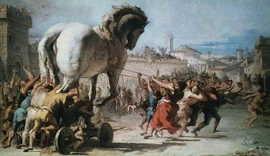
The infamous Trojan Horse that lead to the ransacking of Troy.
The Trojan War was a ten-year-long war fought at Troy between Mycenae and its allies (notably Sparta, Athens, Pylos, Thebes, etc), against Troy and their allies (notably Dardania, Lycia, Aethiopia, Amazonia, Thrace). The war consisted mainly of the siege of the city of Troy, as well as sallies made by the defenders and Greek forays into neighboring regions allied with the Anatolian city.
The war originated from a quarrel between the goddesses of Olympus. It began when all of the gods were invited to Peleus and Thetis' wedding and brought many gifts, except Eris (the goddess of discord), who was stopped at the door by Hermes, on Zeus' order. Insulted, she threw from the door a gift of her own: a golden apple on which was inscribed the word καλλίστῃ Kallistēi ("To the fairest"). The apple was claimed by Hera, Athena, and Aphrodite. They quarreled bitterly over it, and none of the other gods would venture an opinion favoring one, for fear of earning the enmity of the other two.
Eventually, Zeus ordered Hermes to lead the three goddesses to Paris, a prince of Troy, who, unaware of his ancestry, was being raised as a shepherd in Mount Ida, because of a prophecy that he would be the downfall of Troy. After bathing in the spring of Ida, the goddesses appeared to him naked, either for the sake of winning or at Paris' request. Paris was unable to decide between them, so the goddesses resorted to bribes. Athena offered Paris wisdom, skill in battle, and the abilities of the greatest warriors; Hera offered him political power and control of all of Asia; and Aphrodite offered him the love of the most beautiful woman in the world, Helen of Sparta. Paris awarded the apple to Aphrodite, and, after several adventures, returned to Troy, where he was recognized by his royal family.
Menelaus's brother Agamemnon, king of Mycenae, led an expedition of Achaean troops to Troy and besieged the city for ten years because of Paris' insult. After the deaths of many heroes, including the Achaeans Achilles and Ajax, and the Trojans Hector and Paris, the city fell to the ruse of the Trojan Horse. The Achaeans slaughtered the Trojans (except for some of the women and children whom they kept or sold as slaves) and desecrated the temples, thus earning the gods' wrath. Few of the Achaeans returned safely to their homes and many founded colonies in distant shores. The Romans later traced their origin to Aeneas, Aphrodite's son and one of the Trojans, who was said to have led the surviving Trojans to modern-day Italy.